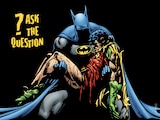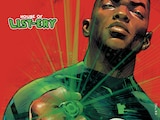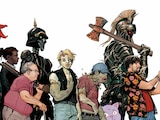It’s a great time for Superman fans, with the Man of Steel soaring into movies, TV, animation and comics. To help us stay on top of it, writer Tim Beedle shares what's grabbed his attention and why in this monthly Superman column.
I write about Superman every month in this column, so it’s not like I don’t have plenty to say about the guy, but I still had a hard time figuring out what I wanted to focus on for this installment.
That’s because Superman is celebrating a pretty major anniversary this month. Kal-El came into this world on April 18, 1938, meaning the big guy has been fighting the good fight for 85 years now. Now, I’m no stranger to DC anniversaries. I’m not even a stranger to Superman anniversaries. I’ve been here long enough to help commemorate a few of them—heck, I even still have a package of cocktail napkins featuring the logo for Superman’s 75th anniversary.
That’s right, they’re from ten years ago. And no, I have no idea how I wound up with them.

The point is that the last thing I should feel when asked to write about Superman for his 85th anniversary is intimidated or overwhelmed, but I think that perhaps I am. Superman is beloved by so many people. He established what it means to be a superhero and consistently ranks first on lists of peoples’ favorites (yes, even higher than Batman).
When it comes to human behavior, I’m no more of an expert than the rest of you are, but if I had to hazard a guess as to why Superman remains so popular over eight decades after his creation, it’s probably because for just about every generation living right now, Superman has always been there and there’s a comfort in that. And to be clear, we’re not just talking about comic book readers here—everyone knows Superman.
We have Christopher Reeve to thank for much of that, but he’s hardly the only one. Younger fans may be more familiar with Tim Daly’s animated Supes or Henry Cavill’s Man of Steel. Older ones may have become first acquainted with George Reeves’ small screen hero or even Bud Collyer’s confident baritone. By existing far beyond the comic book page for so long, Superman has become part of the fabric of our modern world. He’s as much a part of being human in the 21st century as cell phones, streaming networks and TikTok.
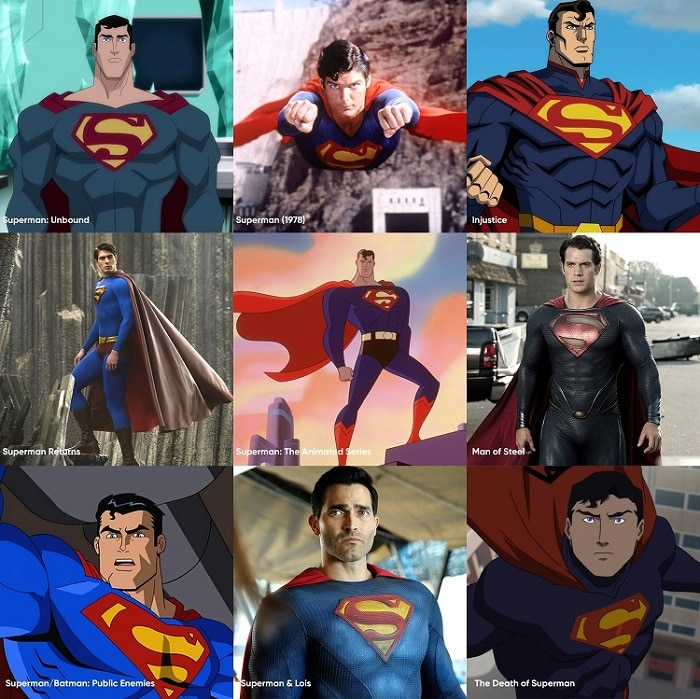
Yet, while I expect all of those things to evolve—if not disappear entirely—over the next 85 years, Superman really hasn’t. Sure, there have been changes to his costume, his hairstyle and his personal life and career, but who Superman is as a hero and as a person? That hasn’t changed at all.
Open up Action Comics #1 and you’ll see it right there on the first page: “Superman! Champion of the oppressed! The physical marvel who had sworn to devote his existence to helping those in need!”
Since his debut, Superman has fought for those unable to fight for themselves and that’s still at the heart of what he does this very day. Everything else you know about Superman comes out of that. The popular claim that he’s a Big Blue Boy Scout? It stems directly from the fact that as a “physical marvel,” Superman could easily bend humankind to his whim, and yet he chooses to do just the opposite and serve those in need. Superman’s battle for “Truth, Justice and a Better Tomorrow?” Those are the very things oppressed people worldwide hope for—the people for whom Superman serves as a champion.
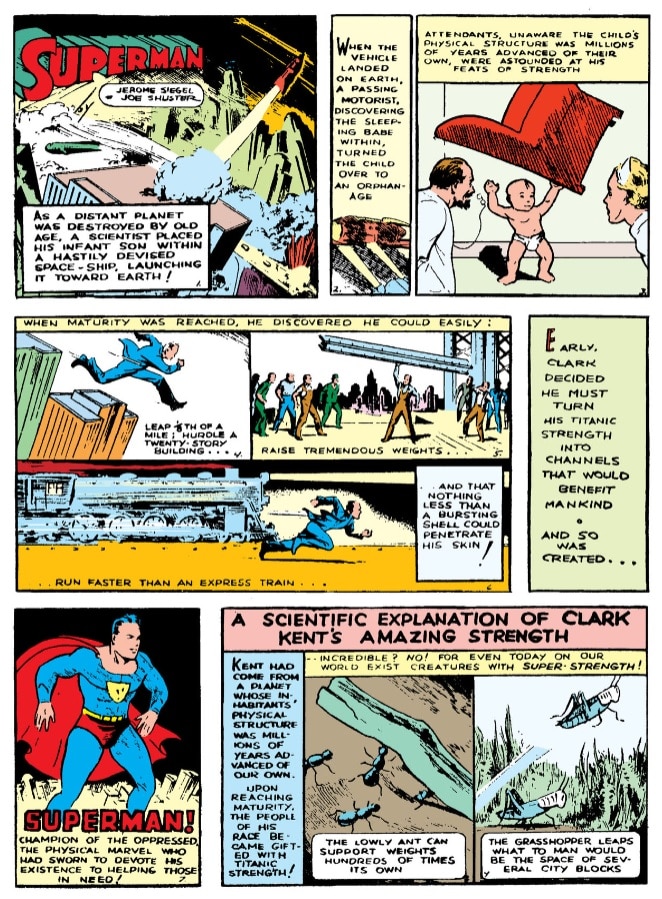
In other words, the language may not be as catchy, knowing or sophisticated as we’ve become accustomed to, but what it’s saying in this initial Superman adventure about its hero is exactly the same as what we might say about Superman today—he fights for the innocent, the good and the wronged.
Which makes this a particularly interesting time for Superman as our perception of what exactly those things mean has evolved. It’s no longer so cut and dry. There are plenty of people who feel wronged these days, and many use those feelings as an excuse to wrong others. Superman may stand for a better tomorrow, but better for whom, exactly? Heck, even at their most justified, Superman’s battles can cause collateral damage that can destroy the very lives he’s trying to save. Were Superman real and not just a fictional character, these concerns and many like them would be raised repeatedly and it’s hard to imagine Kal-El would be as universally beloved as he is. Heck, he’d likely terrify people.
But Superman’s not real, at least not in the flesh-and-blood sense, and perhaps he’s loved all the more for it. After all, his simple, inspiring message has allowed readers worldwide to see him as their hero and it’s allowed Superman, appropriately, to remain above these kinds of inconveniently nuanced distinctions. He’s a champion of good and a symbol of hope—and sometimes, that’s all we need.
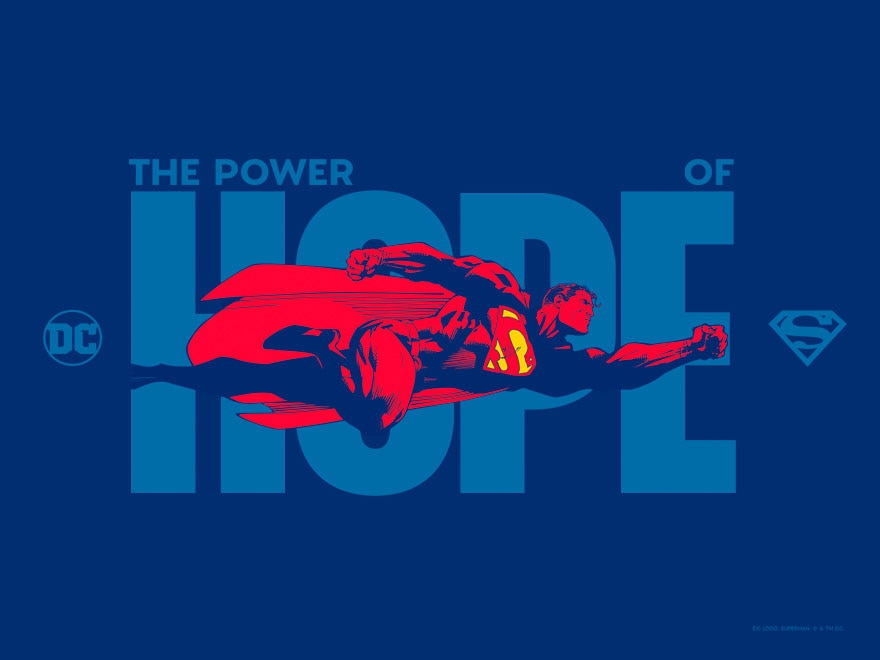
I mean that literally, by the way. Hope is often all we need, and there’s no more powerful symbol of it than Superman. There’s a reason why the word “hope” is so boldly displayed across the new image DC created for Superman’s anniversary. Hope is essential to our existence. It gets us through our difficulties in life, our challenges and our personal battles. It transcends cultures, interests, beliefs and languages. Superman may not be here to fight for us, but he serves as an inspiration of what we can be, and that gives us the strength to fight for ourselves. So, while Superman may not be real, the good he does for our world very much is.
That’s the essence of hope. And while hope’s light may dim every now and then, it will never die. It’s eternal, and so, therefore, is Superman.
Tim Beedle covers movies, TV and comics for DC.com, writes our monthly Superman column, "Super Here For...", and is a regular contributor to the Couch Club, our recurring television column. Follow him on Twitter at @Tim_Beedle.
NOTE: The views and opinions expressed in this feature are solely those of Tim Beedle and do not necessarily reflect those of DC Entertainment or Warner Bros., nor should they be read as confirmation or denial of future DC plans.











